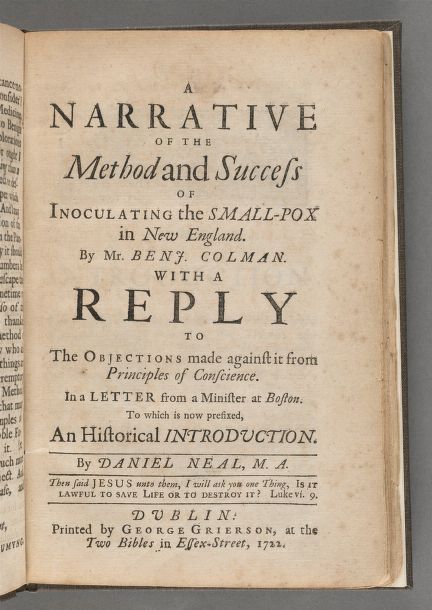The Boston Smallpox Epidemic, 1721
 The Boston Smallpox Epidemic, 1721
The Boston Smallpox Epidemic, 1721
A Narrative of the Method and Success of Inoculating the Small-Pox in New England, 1722. From the holdings of Houghton Library—Harvard College Library.
Between April and December 1721, 5,889 Bostonians had smallpox, and 844 died of it. October was the worst month, with 411 deaths. Smallpox caused more than three–quarters of all the deaths in Boston that year.
Smallpox is a very old disease, with evidence for its presence going back centuries. In Europe and the United States, bouts of smallpox were considered to be almost inevitable, and the disease was greatly feared. Epidemics could kill 30% of those infected and cause permanent disfiguration in the rest. In some populations, the impact was even more severe: After being introduced by 16th-century Europeans, smallpox is said to have killed most of the indigenous population of North America.
Inoculation
It was widely known that survivors of smallpox were immune to later occurrences of the disease. This led to the practice of inoculation–the deliberate introduction of living smallpox virus to cause a mild (it was to be hoped) case of the disease that would provide immunity. The practice of inoculation developed in many parts of the world, often as part of a system of folk medicine.
By the mid–1700s, China, India, and parts of Africa had probably practiced inoculation for centuries; laypeople in Europe probably had been doing so for generations as well. The practice was discussed in the Royal Society in 1699 and published in the Philosophical Transactions of the Royal Society in 1714 and 1716. Inoculation was further popularized among England’s elites after Lady Mary Montague’s 1718 publication of her letters, which related her observation of the procedure in Turkey.
Despite the promise that inoculation seemed to hold for controlling smallpox, the Boston smallpox epidemic of 1721 is known for the passionate controversy over inoculation that erupted in the city, most visibly between Reverend Cotton Mather and Boston physician William Douglass. Mather had learned about the procedure from the Philosophical Transactions of the Royal Society and from one of his slaves. After inoculating his own son, Mather advocated strongly for inoculation as the Boston epidemic grew.
Most Boston physicians, as well as the general public, however, argued with equal passion against inoculation on the grounds that it could spread the disease rather than prevent it; that it could cause a fatal case of smallpox in the inoculated subject; and that it could make the subject susceptible to other diseases. These fears were not groundless: inoculation could indeed cause fatal cases of smallpox, and because inoculation proceeded by the direct transmission of bodily matter from one person to another through an open cut, diseases like syphilis could be spread by the procedure as well. Feelings ran high, and one protestor threw a lighted bomb through the window of Mather’s house.
Douglass, with his medical degree from Edinburgh, was Boston’s only university–trained doctor. He argued that Mather’s inoculations undermined legitimate medical authority and contended that inoculation without regulated quarantine of the inoculated afterwards would only make the epidemic worse. Given that Mather was neither carrying out his inoculations in an organized manner nor isolating newly inoculated patients appropriately, Douglass’s criticism was legitimate.
Only one physician, Zabdiel Boylston, publicly supported Mather’s efforts after trying out the procedure on his own son and two slaves. Boylston would eventually inoculate around 180 people, including many prominent Bostonians.
God’s Will?
The religious debate was also important. Mather, who had lost his wife and three youngest children in a measles epidemic, argued that inoculation was a gift from God. Those opposed to inoculation argued that epidemic diseases afflicted the people for a divine reason, and that to attempt to prevent them was to oppose God’s will. Others argued that inoculation, with its roots in Africa, Asia, and the Middle East, was a heathen practice not suitable for Christians.
Contagion: Historical Views of Diseases and Epidemics